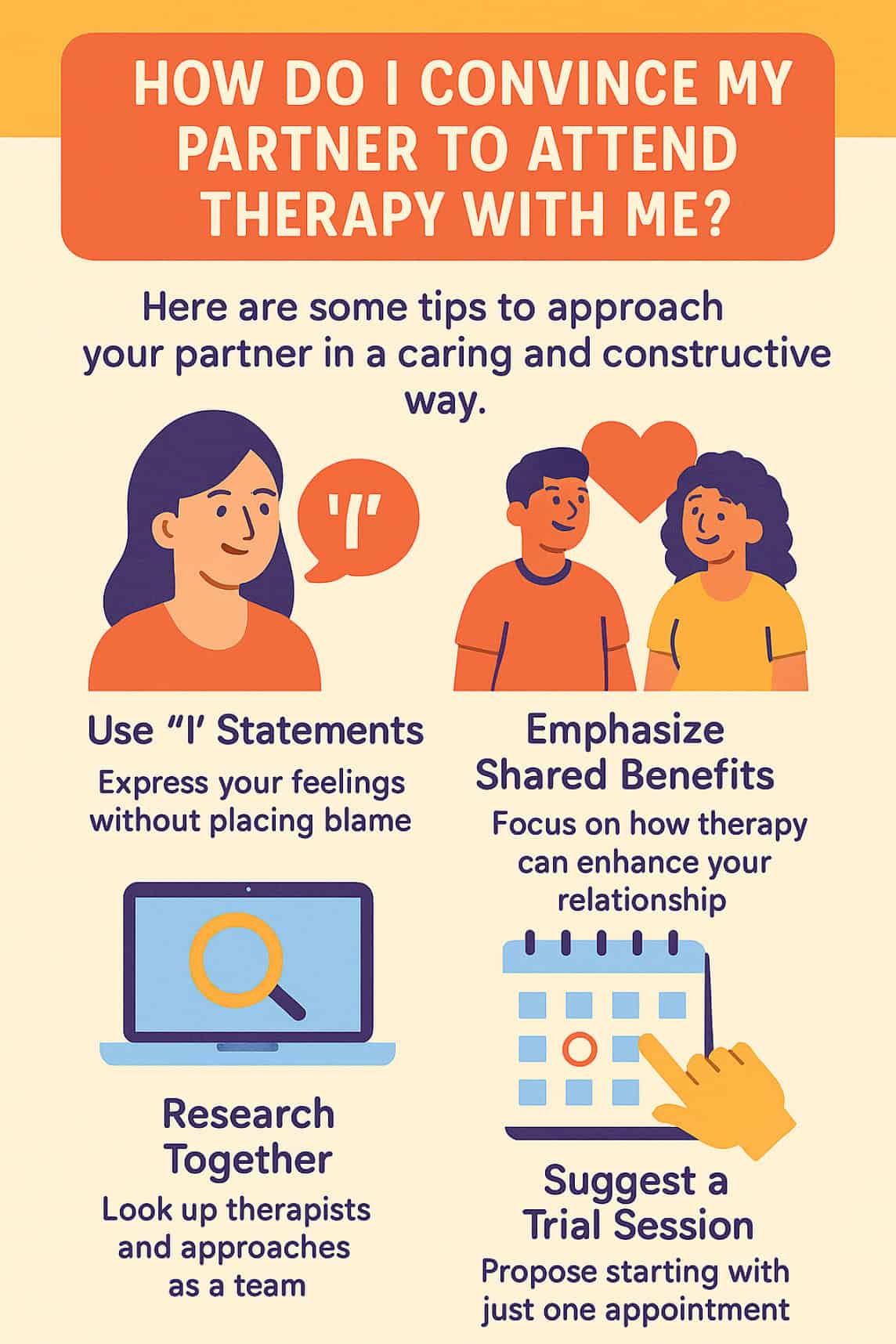
Key Takeaways Convince Your Partner to Attend Therapy.
- Use “I” statements to express your feelings without blame.
- Emphasise shared benefits like less stress, better communication, and stronger connection.
- Choose a calm moment to have the conversation.
- Suggest attending a single session just to explore the idea together.
- Offer to research therapists or book the appointment together.
- Be patient if your partner is hesitant, and revisit the idea later.
👉 Ready to take the first step? Visit the Couples Counselling page to learn more or book a 15-minute complimentary phone call consultation.

You can convince your partner to attend therapy by sharing your concerns with empathy, focusing on the mutual benefits of counselling, and inviting your partner to explore options together so the process feels safe and collaborative rather than threatening or blame based.
Why Your Approach Matters.
The Power of “I” Statements.
When you lead with “I feel worried about our growing distance,” instead of “You never listen,” your partner is less likely to feel attacked.
Mutual Gains Over Blame.
Stress relief, healthier communication, and a stronger bond benefit both of you. Framing therapy as a shared investment makes it harder to refuse.
Prepare Your Talking Points.
- Identify Your Main Concern.
- Pick one or two concrete issues, like frequent arguments about money.
- Clarify the Desired Outcome
- Explain that you hope therapy can reduce conflict and bring back closeness.
- Gather Practical Info
- Find local therapists in Orangeville, Toronto, or the GTA who offer evening or virtual sessions
Choose the Right Time and Place.
- Pick a Calm Moment
Avoid starting the conversation in the middle of a fight or when either of you is tired. - Use Neutral Ground
Discuss it during a walk or over coffee to keep the environment relaxed.
Lead With Curiosity, Not Assumptions.
“I have been thinking about ways we can feel closer. How would you feel about us talking to a professional together?”
- Invite Feedback
Listen to concerns such as cost or fear of being judged. - Acknowledge Valid Points
“I understand it feels scary to open up. We can start with one session and see how it goes.”
Highlight Shared Benefits.
| Challenge | Therapy Benefit |
|---|---|
| Constant arguments | Neutral space to learn conflict skills |
| Work stress spilling into home | Stress management strategies |
| Emotional distance | Exercises that rebuild intimacy |
Real World Example.
One Orangeville couple reported that after six Gottman based sessions, weekly fights dropped from five to one and date nights felt fun again.
Offer to Do the Legwork Together.
- Research Therapists as a Team
- Visit websites, read bios, and shortlist two or three professionals.
- Schedule a Trial Session
- Agree to reassess after the first appointment.
- Discuss Logistics
- Suggest rotating who drives or who schedules childcare to share responsibility.
Handle Objections Gracefully.
| Objection | Possible Response |
|---|---|
| “It costs too much.” | “Many therapists offer sliding scales or insurance receipts, let’s check our benefits.” |
| “I do not want a stranger knowing our business.” | “Therapists follow strict confidentiality rules, we control what we share.” |
| “We can solve this ourselves.” | “We have tried for months, a neutral coach could speed up progress.” |
Keep the Door Open.
If your partner still says no:
- Shift to “I” language again: “I will start individual sessions to learn tools that can help us.”
- Share Small Wins: Mention helpful techniques you learn, sparking curiosity.
- Ask Later: Revisit the idea in a few weeks when emotions are calmer.
Your Next Step Toward a Healthier Relationship.
To convince partner to attend therapy, focus on empathy, mutual benefits, and shared decision making. When you frame counselling as a supportive tool rather than a punishment, your partner is more likely to say yes. Ready to explore options together? Visit our Couples Counselling page to learn more or book your free 15 minute phone consultation today.
How can I convince my partner to attend couples therapy without making them feel blamed?
To convince your partner to attend therapy, it is important to use “I” statements that express your feelings without pointing fingers. For example, say “I feel disconnected and want us to reconnect,” instead of “You never make time for me.” This approach reduces defensiveness and keeps the conversation open and respectful.
What if my partner says couples therapy is too expensive?
If cost is the issue, you can still convince your partner to attend therapy by explaining that many therapists offer sliding scale rates or provide insurance receipts. You can check your extended health benefits together and explore more affordable options, including virtual or group counselling.
My partner does not believe in couples therapy. How can I convince them to give it a try?
To convince your partner to attend therapy, focus on shared goals rather than convincing them to change their beliefs. Suggest starting with just one session to explore if it could help reduce stress or improve communication. Framing it as a neutral space to learn new tools often reduces resistance.
Is there a best time to bring up the idea of couples therapy with my partner?
Yes. To successfully convince your partner to attend therapy, timing matters. Choose a calm, neutral moment when you are both relaxed, not in the middle of an argument. Bring it up with curiosity by saying something like, “How would you feel about us trying a session together to reconnect?”
What if my partner still refuses to go to couples therapy with me?
If you cannot convince your partner to attend therapy right now, consider starting individual sessions yourself. You can still learn helpful tools that may improve the relationship and reduce tension. Sharing small wins from your own experience might eventually inspire your partner to join later on.

